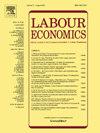Gender homophily in job referrals: Evidence from a field study among university students
IF 2.2
2区 经济学
Q2 ECONOMICS
引用次数: 0
Abstract
We conducted a field study at a Swedish business school to investigate gender homophily in referrer behavior. In the study, 453 participants were asked to refer another student at the school for a real job. We find that both men and women mainly refer candidates of their own gender: 71% of female participants referred a female candidate, and 75% of male participants referred a male candidate. The gender composition of close friendship networks appears to be an important driver of this pattern. Randomizing participants across two job advertisements, we find suggestive evidence that the degree of gender homophily in job referrals is stronger when the job is more consistent with stereotypes associated with the participant’s own gender.
工作推荐中的性别同一性:来自大学生实地研究的证据
我们在瑞典一所商学院进行了一项实地研究,以调查推荐人行为中的性别同一性。在这项研究中,453名参与者被要求为学校的另一名学生推荐一份真正的工作。我们发现男性和女性都主要推荐自己性别的候选人:71%的女性参与者推荐女性候选人,75%的男性参与者推荐男性候选人。亲密友谊网络的性别构成似乎是这种模式的重要驱动因素。在两个招聘广告中随机抽取参与者,我们发现,当工作更符合参与者自身性别的刻板印象时,工作推荐中的性别同一性程度就更强。
本文章由计算机程序翻译,如有差异,请以英文原文为准。
求助全文
约1分钟内获得全文
求助全文
来源期刊

Labour Economics
ECONOMICS-
CiteScore
3.60
自引率
8.30%
发文量
142
期刊介绍:
Labour Economics is devoted to publishing research in the field of labour economics both on the microeconomic and on the macroeconomic level, in a balanced mix of theory, empirical testing and policy applications. It gives due recognition to analysis and explanation of institutional arrangements of national labour markets and the impact of these institutions on labour market outcomes.
 求助内容:
求助内容: 应助结果提醒方式:
应助结果提醒方式:


